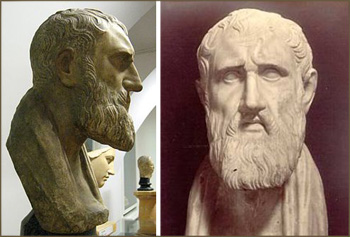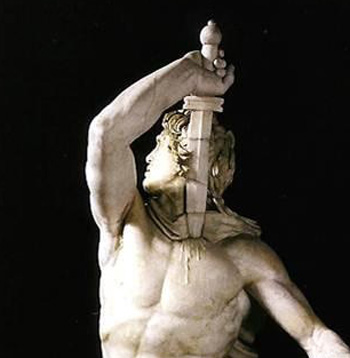Secret Forces & Gnosis
 |
 |
 |
 |
 |
 |
 |
Stoicism, Apathy & Fatalism
Dear TIA,
Thank you for your excellent work. May I suggest a topic for a future article on your site? I would like to read an article on stoic philosophy from a Catholic point of view.
Best,
M.E.
TIA responds:
Dear M.E.,
Below is a summary of stoic philosophy and a Catholic critique of it to assist you in your needs.
Cordially,
TIA correspondence desk
Stoic philosophy
The Stoic school of philosophy was founded by Zeno of Citium about 300 BC, and is named after the stoa or porch in Greek, from which Zeno taught. It was strongly concerned with ethics. It taught that life must be in conformity with right reason, that man must attain a state of complete apathy and release from emotions, and that the truly wise man is, thus, free from evil because he is indifferent to anything that befalls him.
Stoicism was also a monistic and gnostic philosophy because it believed that there was one principle spirit of the universe that permeated nature. This world-spirit was believed to be a material god made up of a fiery breath, called pneuma or soul of the world, that infused all creatures with heat and life.
Once the cycle of creation had taken its course, the pneuma would consume the world with fire and restart the cycle of events all over again. Each cycle was identical to the last as each played out the divine plan of the world-spirit. Thus the stoic philosophy was materialist, monist and fatalist. Not even spirits were immaterial, as these were also descended from the fiery body of the first principle; the pneuma.
 As the pneuma controls and governs the universe according to its own divine reason, so nature itself is rational. Anything that happens is a pre-ordained event that is in accordance with the divine dictates of this nature-fate. Thus, the stoic god was immanent in creation and nothing that could happen was against the divine will. It is, therefore, according to “nature” that we have the health or wealth that we have and it is equally according to nature-fate if we should lose them.
As the pneuma controls and governs the universe according to its own divine reason, so nature itself is rational. Anything that happens is a pre-ordained event that is in accordance with the divine dictates of this nature-fate. Thus, the stoic god was immanent in creation and nothing that could happen was against the divine will. It is, therefore, according to “nature” that we have the health or wealth that we have and it is equally according to nature-fate if we should lose them.
Evil, as such, only originates when we are overwhelmed by our emotions, giving way to passions that are disobedient to reason. Passions arise only from false judgments of what is good or bad. Unhappiness only comes when we desire that which we cannot have or reject that which we cannot avoid. Hence the virtuous and wise man should not be manipulated by his passionate reaction to things, but rather subject his emotions to reason, gladly accepting the decrees of fate.
Whether the soul of the world called a man to be surrounded by pleasures or tortured to death, whatever happens is appropriate to the rational design of the universe. Thus, the wise man should be indifferent and accept the things over which he has no control, letting his soul live in conformity to the divine plan of the universe.
The stoic, therefore, sought happiness not through the amassing of pleasures, but through living in conformity with the design of the universal being, the soul of the world or pneuma. This was believed to be the height of stoic virtue: to be above passions, to receive pain as readily as pleasure, and to calmly and rationally withhold assent from false judgments, accepting whatever fate sends you.
Evaluation & influence
 Though not many of their writings survive, the stoics had a powerful effect on the ancient Greek and Roman world. In truth, there were some good and healthy elements of Stoicism, such as the patient endurance of suffering, the subduing of the passions, the acceptance of the hardships of life and the disregard of earthly pleasures as a means of happiness. As a pagan philosophy, it attained thus a certain degree of righteousness, but was still riddled through with errors.
Though not many of their writings survive, the stoics had a powerful effect on the ancient Greek and Roman world. In truth, there were some good and healthy elements of Stoicism, such as the patient endurance of suffering, the subduing of the passions, the acceptance of the hardships of life and the disregard of earthly pleasures as a means of happiness. As a pagan philosophy, it attained thus a certain degree of righteousness, but was still riddled through with errors.
Stoicism is inherently flawed, both in its immanent conception of God as a world spirit and in its denial of emotions as legitimate responses.
God is a pure spirit distinct from the universe that He created. He is not an immanent fire or spirit of fire that permeates creation.
Strong emotions cannot be discarded as evil. Instead, they are an integral part of our human nature. One of the three faculties of our soul is sensibility – along with intelligence and will – which is turned toward capturing, purifying and ordering our sensitive impressions in which emotions are included. Our Lord himself expressed rage in response to the money-lenders in the Temple, manifested joy at the Last Supper by singing the Canticle of Moses, and on numerous occasions expressed a legitimately deep and painful sorrow.
Errors coming from fatalism
 St. Augustine condemns the stoics, both for seeking a state of earthly happiness and for their acceptance of suicide as a recourse, if living becomes too incommodious. Any philosophy that holds that natural suffering is not evil, yet believes that taking one's life is a legitimate alternative to enduring suffering is contradictory. What kind of happy life drives one to kill himself? As Catholics, we must remember that fortitude is a virtue and does not consist simply in negating emotions. Stoicism was, thus, a pagan philosophical system that preached apathy based upon the three errors of fatalism, immanentism and materialism.
St. Augustine condemns the stoics, both for seeking a state of earthly happiness and for their acceptance of suicide as a recourse, if living becomes too incommodious. Any philosophy that holds that natural suffering is not evil, yet believes that taking one's life is a legitimate alternative to enduring suffering is contradictory. What kind of happy life drives one to kill himself? As Catholics, we must remember that fortitude is a virtue and does not consist simply in negating emotions. Stoicism was, thus, a pagan philosophical system that preached apathy based upon the three errors of fatalism, immanentism and materialism.
The Catholic Church, as we pointed out above, teaches that God is a pure spirit, Who is not substantially immanent in His creation. Man has free will and is not subjected to a blind fatality. Emotions are a part of our nature that should be accepted when the circumstances are appropriate.
Thus, while Stoicism was a relevant philosophy and did have some commendable points, it was rightly set aside to make way for the perfect philosophy of Christianity in which pains and joys are accepted on this earth as a preparation for eternal life, following the steps of Our Lord Jesus Christ, Who taught us by His example the way of the Cross.

Thank you for your excellent work. May I suggest a topic for a future article on your site? I would like to read an article on stoic philosophy from a Catholic point of view.
Best,
M.E.
______________________
TIA responds:
Dear M.E.,
Below is a summary of stoic philosophy and a Catholic critique of it to assist you in your needs.
Cordially,
TIA correspondence desk
______________________
Stoic philosophy
The Stoic school of philosophy was founded by Zeno of Citium about 300 BC, and is named after the stoa or porch in Greek, from which Zeno taught. It was strongly concerned with ethics. It taught that life must be in conformity with right reason, that man must attain a state of complete apathy and release from emotions, and that the truly wise man is, thus, free from evil because he is indifferent to anything that befalls him.
Stoicism was also a monistic and gnostic philosophy because it believed that there was one principle spirit of the universe that permeated nature. This world-spirit was believed to be a material god made up of a fiery breath, called pneuma or soul of the world, that infused all creatures with heat and life.
Once the cycle of creation had taken its course, the pneuma would consume the world with fire and restart the cycle of events all over again. Each cycle was identical to the last as each played out the divine plan of the world-spirit. Thus the stoic philosophy was materialist, monist and fatalist. Not even spirits were immaterial, as these were also descended from the fiery body of the first principle; the pneuma.

Zeno of Citium
Evil, as such, only originates when we are overwhelmed by our emotions, giving way to passions that are disobedient to reason. Passions arise only from false judgments of what is good or bad. Unhappiness only comes when we desire that which we cannot have or reject that which we cannot avoid. Hence the virtuous and wise man should not be manipulated by his passionate reaction to things, but rather subject his emotions to reason, gladly accepting the decrees of fate.
Whether the soul of the world called a man to be surrounded by pleasures or tortured to death, whatever happens is appropriate to the rational design of the universe. Thus, the wise man should be indifferent and accept the things over which he has no control, letting his soul live in conformity to the divine plan of the universe.
The stoic, therefore, sought happiness not through the amassing of pleasures, but through living in conformity with the design of the universal being, the soul of the world or pneuma. This was believed to be the height of stoic virtue: to be above passions, to receive pain as readily as pleasure, and to calmly and rationally withhold assent from false judgments, accepting whatever fate sends you.
Evaluation & influence

The stoics imagined that the spirit of fire – their god – was immanent in everything in the universe
Stoicism is inherently flawed, both in its immanent conception of God as a world spirit and in its denial of emotions as legitimate responses.
God is a pure spirit distinct from the universe that He created. He is not an immanent fire or spirit of fire that permeates creation.
Strong emotions cannot be discarded as evil. Instead, they are an integral part of our human nature. One of the three faculties of our soul is sensibility – along with intelligence and will – which is turned toward capturing, purifying and ordering our sensitive impressions in which emotions are included. Our Lord himself expressed rage in response to the money-lenders in the Temple, manifested joy at the Last Supper by singing the Canticle of Moses, and on numerous occasions expressed a legitimately deep and painful sorrow.
Errors coming from fatalism

Suicide became a common practice among stoics when they could not bear their fate
The Catholic Church, as we pointed out above, teaches that God is a pure spirit, Who is not substantially immanent in His creation. Man has free will and is not subjected to a blind fatality. Emotions are a part of our nature that should be accepted when the circumstances are appropriate.
Thus, while Stoicism was a relevant philosophy and did have some commendable points, it was rightly set aside to make way for the perfect philosophy of Christianity in which pains and joys are accepted on this earth as a preparation for eternal life, following the steps of Our Lord Jesus Christ, Who taught us by His example the way of the Cross.
- Sources:
- Federico Klimke, Historia de la Filosofia, Barcelona: Editorial Labor, 1947.
- Paul Foulquié, & Raymond Saint-Jean, Dictionnaire de la Langue Philosophique, Paris: Presses Universitaires de France, 1962. Entry “Stoicisme”
- Vacant, Mangenot Dictionnaire de Theologie Catholique, 1941, entry “Théologies et Philosophies Médiévales”

Posted May 3, 2016
______________________
______________________
 Volume I |
 Volume II |
 Volume III |
 Volume IV |
 Volume V |
 Volume VI |
 Volume VII |
 Volume VIII |
 Volume IX |
 Volume XI |
 Special Edition |
 Special Edition |


